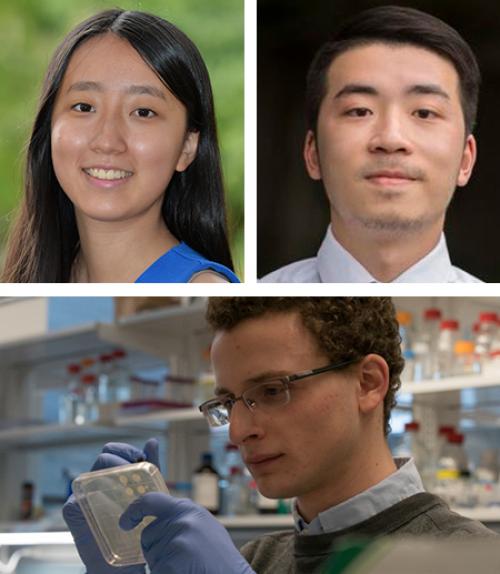Five Arts & Sciences students are among those named United Nations Millenium Fellows. They will join a group of 530 student leaders worldwide who are advancing the United Nations’ Sustainable Development Goals in their communities.
Students across 57 countries applied for the fellowship, with 530 Millennium Fellows chosen, including Arts & Sciences students Emily Wang ‘20, Shi Guofeng ‘22, Joanna Hua ‘20, Andrew Rosenblatt ’20 and Afnan Arshad ‘21.
The Millennium Fellowship is a semester-long leadership development program and a partnership between the United Nations Academic Impact (UNAI) and the Millennium Campus Network (MCN). The MCN was founded in 2007 to help students advance the eight United Nations Millennium Development Goals, which were created to improve the lives of the world’s poorest people. The goals include eradicating extreme poverty and hunger, achieving universal primary education, promoting gender equality and empowering of women, reducing child mortality, improving maternal health, combating HIV/AIDS, malaria and other diseases, ensuring environmental sustainability and developing a global partnership for development.
Cornell’s cohort will organize campus-wide sustainability initiatives and projects.
Wang, a biology major, aims to raise awareness and change around food insecurity both on and off campus. Wang is a manager at Anabel’s Grocery, a student-run affordable store addressing food insecurity on campus. Wang is also a nutrition teaching assistant at the Cornell Prison Education Program and the Greater Ithaca Activities Center and a volunteer at the Ithaca Free Clinic.
Wang’s Millennium Fellowship project is the Food Pharmacy Network, which she founded this year. The Food Pharmacy Network is an organization dedicated to connecting healthcare organizations to food banks to provide free produce and household staples to patients in need.
“We hope to strengthen the link between nutrition and wellbeing to become a solution to food insecurity,” Wang said.
Earlier this year, Wang reached out to Wegmans and Tops for donations.
So far, the Food Pharmacy Network has food pharmacies under full operation at the Ithaca Free Clinic, the Rahma Free Clinic through the Syracuse Upstate Medical School and the Haven Free Clinic at Yale School of Medicine. Food pharmacies are also under development at the Weill Cornell Community Clinic in New York City, Pioneer Valley Free Health Services in Longmeadow, Mass., and Volunteers in Medicine Berkshires in Great Barrington, Mass.
“Food-insecure patients are often afraid of the stigmatization of food pantries,” Wang said. “But hosting food pharmacies at free clinics will take this fear away and emphasize the link between nutrition and health. This way, we are providing a compelling solution to a potential social determinant of health.”
The network has served 10,000 patients so far. Wang’s goal is to expand to 15 clinics in full operation by the end of the Millennium Fellowship. This would impact an estimated 2,500 more patients. The network was also a recipient of a grant from the Food Bank of Central New York.
“I would love to help the Brooklyn Free Clinic start its own food pharmacy,” Wang said. “The venture is a low commitment for the clinic, but has a high impact on all patients.”
Hua, a government major on a pre-medical track, is also the director of outreach for the annual Cornell Model United Nations Conference.
Hua’s project is the Cornell Model UN Conference Community project, which using financial aid to expand Cornell’s Model UN Conference to communities that may not usually have the opportunities to learn and attend the conference. Hua will be applying to grants and partnering with the director of public relations of the organization to raise money for those who need it.
Rosenblatt is a biological sciences major and the campus director of the Kidney Disease Screening and Awareness Program, a multi-campus organization dedicated to the prevention of kidney disease in medically and socio-economically disadvantaged communities. Rosenblatt also conducts research on overcoming antibiotic resistance in cholera and serves on the Student Assembly’s Health and Wellness Committee.
Rosenblatt’s project is the Healthy Halloween Initiative, which aims to reduce the risk of alcohol poisoning and sexual assault during campus festivities. The pilot for the initiative, which is being held close to this year’s Halloween, aims to serve several hundred students by defusing unsafe situations and medically assisting students. By working toward a safer community in which students of all genders feel secure and at ease, this initiative is working toward gender equality, he said.
Arshad, an economics and computer science major, founded the ABC123 program, which aims to help alleviate the struggles of Pakistanis who have faced religious discrimination. Arshad’s goals is to find ways to project humanity forward and makes lives better, not just for people who can afford new technology.
Guofeng, a freshman considering a computer science and mathematics major, is interested in advancing the Millennium Development goals of good health and well-being and gender equality through a project to educate Chinese youth about sex education.
“I was raised up in the undeveloped area of China, where people lack education. My mom’s job was related to public health. I helped her to send fliers about public health when I was young,” Guofeng said. “People were shy to talk about sex, which led to a relatively high sexually transmitted infections rate.”
Guofeng is writing articles about sex education and gender equality and publishing them on WeChat twice a month. He also works with local health organizations to help patients with HIV.
“I am eager to make a change to the world, even as a college student,” Guofeng said.
Yvette Lisa Ndlovu is a communications assistant for the College of Arts & Sciences.




